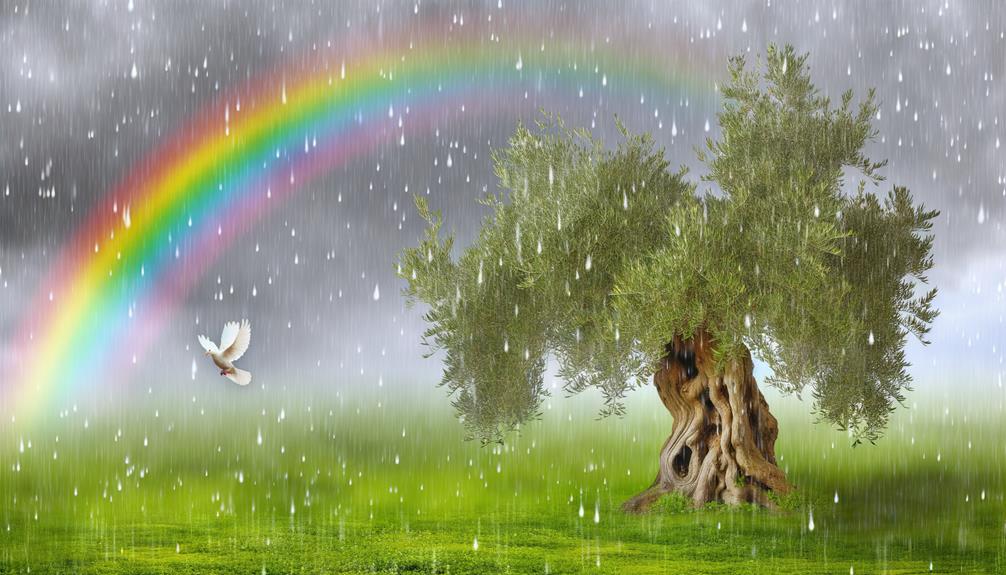Symbolic Meaning of Rain in the Bible: Blessing and Renewal
In the Bible, rain is a multifaceted symbol embodying divine blessing and favor, judgment, covenantal promise, spiritual renewal, and prophetic significance. It signifies God’s provision and mercy, essential for sustenance and agricultural prosperity, while also representing divine judgment and cleansing as seen in narratives such as the Flood and Elijah’s drought.
Covenantally, rain underscores God’s fidelity and the interplay between obedience and divine favor. Additionally, rain illustrates spiritual rebirth, purification, and renewal, likened to the transformative power of God’s Word.
Prophetic and parabolic uses of rain deepen its significance, revealing profound theological insights and eschatological visions. Explore further for intricate theological connections.

Symbolic Meaning of Rain in the Bible: Blessing, Spiritual Refreshment, and Renewal
| Aspect | Biblical Meaning |
|---|---|
| Blessing & Provision | Rain is often a symbol of God’s blessing and provision, representing the sustenance of life, crops, and spiritual nourishment (Deuteronomy 28:12). |
| Spiritual Refreshment | Rain signifies spiritual refreshment and renewal, symbolizing the outpouring of God’s grace, mercy, and the Holy Spirit (Joel 2:23). |
| Cleansing & Purification | Rain can also represent cleansing and purification, washing away impurities and bringing about a fresh start, similar to how God cleanses sin (Ezekiel 36:25). |
| Judgment & Correction | At times, the lack or abundance of rain is used as a sign of God’s judgment or correction, as seen when God withheld rain due to Israel’s disobedience (1 Kings 17:1). |
| Renewal & Growth | Spiritually, rain encourages growth, symbolizing the process of renewal, restoration, and the flourishing of life and faith (Isaiah 55:10-11). |
Rain as Divine Blessing

Rain is frequently depicted in the Bible as a symbol of divine blessing, representing God’s favor and provision for His people. This symbolism is evident in numerous passages, such as Deuteronomy 28:12, where God promises to open the heavens and send rain to bless the work of His people’s hands.
In an agrarian society, rain was essential for crops and sustenance, making it a powerful metaphor for divine generosity. Similarly, in Joel 2:23, the ‘early and latter rain’ signifies not only physical nourishment but also spiritual renewal.
The consistent linkage of rain with divine benevolence underscores a theological theme: God’s active involvement in the well-being of His followers, ensuring their material and spiritual prosperity.
Symbol of Judgment

In biblical literature, precipitation often serves as an instrument of divine judgment, illustrating God’s power to enforce moral and covenantal laws. This symbolism is vividly depicted through various narratives where rain or the lack thereof signifies divine retribution.
For instance:
- The Flood (Genesis 7:11-24) – God releases a deluge to cleanse the world of its pervasive wickedness.
- Elijah’s Drought (1 Kings 17:1) – A prolonged drought punishes Israel for its idolatry.
- Sodom and Gomorrah (Genesis 19:24) – Rain transforms into sulfur and fire, executing judgment on the sinful cities.
- The Plagues of Egypt (Exodus 9:22-26) – Hail mixed with fire decimates the land, showcasing God’s displeasure with Pharaoh’s obstinance.
These instances underscore rain’s dual role as both a life-giving and judgment-rendering force in biblical narratives.
Covenant and Promise

In the context of biblical narratives, rain often symbolizes God’s covenant and promise, manifested vividly in the story of Noah’s Ark.
The rainbow, appearing after the flood, serves as a divine sign of this covenant, assuring that such a deluge would never recur.
This motif of rain as a harbinger of renewal underscores the theological theme of rebirth and divine fidelity throughout the scriptures.
Rainbow as God’s Promise
The appearance of the rainbow in the biblical narrative of Noah signifies a divine covenant, representing God’s promise to never again destroy the earth with a flood. This symbolic gesture transcends mere meteorological phenomena, encapsulating a broader theological significance.
Divine Assurance: The rainbow serves as a perpetual reminder of God’s mercy and commitment to humanity.
Universal Symbol: It transcends cultural and temporal boundaries, offering a universal sign of hope and divine benevolence.
Covenantal Seal: The rainbow functions as a tangible, visible seal of the covenant between God and all living creatures.
Theological Implications: Its appearance post-flood signifies a new beginning, emphasizing themes of renewal and redemption.
Thus, the rainbow is a multifaceted symbol within biblical theology, rich in meaning and promise.
Noah’s Ark Covenant
Frequently, the Noah’s Ark Covenant is examined as a foundational moment in biblical theology, where God’s promise to humanity and all living creatures is first codified. This covenant, detailed in Genesis 9:8-17, follows the cataclysmic flood and establishes a divine pledge never to destroy the earth by water again.
The covenant transcends mere survival, introducing a theological framework of divine mercy and human responsibility. It serves as an early instance of God’s enduring commitment to creation, symbolized through the establishment of laws and ethical directives.
In this regard, rain shifts from an instrument of judgment to a reminder of divine fidelity, shaping the relationship between God, humanity, and the natural world in perpetuity.
Sign of Renewal
Rain in biblical narratives often emerges as a potent symbol of renewal, embodying the themes of divine covenant and promise.
In the context of covenant, rain signifies God’s enduring faithfulness and the regeneration of creation. For example:
- Noahic Covenant: After the Flood, rain becomes a sign of God’s promise never to destroy the earth by water again (Genesis 9:11).
- Mosaic Covenant: Rain is portrayed as a blessing contingent on Israel’s obedience (Deuteronomy 11:14).
- Prophetic Imagery: Prophets like Isaiah use rain to symbolize spiritual renewal and divine grace (Isaiah 55:10-11).
- Eschatological Vision: Revelation describes rain as part of the new creation, a witness to God’s ultimate promise (Revelation 22:1-2).
Thus, rain encapsulates the perpetual and renewing nature of divine promises.
Renewal and Cleansing

The motif of rain in the Bible often signifies renewal and cleansing, embodying themes of spiritual rebirth and divine forgiveness.
This symbolism is evidenced through scriptural narratives where rain functions as a purifying agent, washing away impurities and heralding new beginnings.
Consequently, rain serves as a potent metaphor for the transformative processes of purification and redemption in the spiritual context.
Spiritual Rebirth Significance
In biblical texts, rain is often emblematic of spiritual rebirth, serving as a potent symbol of renewal and cleansing. This symbolism is deeply embedded within the scriptures, reflecting the divine act of rejuvenation.
The imagery of rain conjures several profound associations:
- Purification: Rainwater washes away impurities, symbolizing the cleansing of the soul.
- Growth: Just as rain nurtures the earth, it signifies spiritual growth and the flourishing of faith.
- Restoration: Rain revives parched lands, analogous to the restoration of a weary spirit.
- Divine Blessing: The arrival of rain is often seen as a heavenly gift, representing God’s favor and grace.
These elements collectively underscore rain’s role in illustrating the transformative journey of spiritual rebirth in biblical contexts.
Divine Forgiveness Symbolism
Amidst the rich tapestry of biblical symbolism, rain frequently emerges as a powerful metaphor for divine forgiveness, encapsulating themes of renewal and cleansing.
Scriptural passages such as Hosea 6:3 and Isaiah 55:10-11 illustrate rain as a divine act that not only replenishes the earth but also signifies God’s mercy washing away sin.
The metaphorical rain symbolizes a fresh start, underscoring the transformative power of divine grace. Through this lens, rain is more than a natural phenomenon; it embodies the hope and assurance of spiritual renewal.
This symbolism aligns with the broader biblical narrative where forgiveness leads to a restored relationship with God, thereby rejuvenating the believer’s spiritual life and fostering a deeper connection with the divine.
Purification Through Rain
Many biblical passages utilize rain as a profound symbol of purification, signifying the themes of renewal and cleansing that are central to scriptural teachings. This imagery is vividly portrayed in various contexts:
- Noah’s Flood: The deluge serves as a divine reset, washing away corruption to start anew.
- Israel’s Restoration: Prophetic texts often describe rain as a blessing that revitalizes the land and people.
- Ritual Cleansing: Rainwater is symbolically linked to purification rites, reflecting spiritual cleanliness.
- Messianic Prophecies: Rain heralds the coming of an era of righteousness and renewal.
These examples underscore rain’s multifaceted role in illustrating divine purification, aligning with broader biblical theology that emphasizes transformation and sanctification through divine intervention.
Metaphor for Spiritual Refreshment

Rain in the Bible frequently serves as a potent symbol for spiritual refreshment, representing the rejuvenation and nurturing of one’s faith. This metaphor underscores the transformative power of divine grace, akin to how rain revitalizes parched earth. Biblically, rain is often depicted as a divine blessing, facilitating spiritual growth and renewal. For instance, in Deuteronomy 32:2, teachings are likened to rain, nurturing the soul.
| Scripture Reference | Symbolism | Contextual Meaning |
|---|---|---|
| Deuteronomy 32:2 | Rain | Divine Teaching |
| Isaiah 55:10-11 | Water | God’s Word |
| Hosea 6:3 | Showers | Knowledge of God |
| Joel 2:23 | Early Rain | Righteousness |
This table illustrates how various scriptures utilize rain as a metaphor for divine intervention, emphasizing spiritual growth and enlightenment.
Rain in Parables

In addition to symbolizing spiritual refreshment, rain is frequently utilized in biblical parables to convey deeper theological truths and moral lessons. These parables often employ the imagery of rain to elucidate the dynamics of divine grace and human response.
For instance, consider:
- The Parable of the Sower: Rain signifies the nurturing of seeds, symbolizing the Word of God falling on different types of soil, representing various human hearts.
- The Parable of the Wise and Foolish Builders: Rain and floods test the foundations of houses, illustrating the resilience of faith.
- The Parable of the Fig Tree: Seasonal rain reflects the anticipation of spiritual renewal and God’s timing.
- The Parable of the Mustard Seed: Rain facilitates growth, symbolizing the expansion of God’s kingdom from small beginnings.
This use of rain as an allegorical device enriches the spiritual and moral implications within these narratives.
Prophetic Significance

Throughout the scriptures, the prophetic significance of rain is intricately woven into the fabric of divine revelation, symbolizing both blessing and judgment.
Rain often serves as a harbinger of God’s favor, as seen in Joel 2:23, where the ‘former and latter rain’ signifies restoration and abundance.
Conversely, the withholding of rain, as depicted in Deuteronomy 11:17, acts as a divine admonition, warning of impending drought and famine due to disobedience.
In addition, the eschatological vision in Zechariah 14:17 underscores rain as a pivotal element in God’s ultimate plan, where nations that do not worship Him will face a lack of rain.
Consequently, rain in prophetic texts encapsulates the dual themes of divine provision and retribution.
Rain in Biblical Festivals

The prophetic symbolism of rain extends into the domain of biblical festivals, where it embodies themes of renewal, divine favor, and covenantal promises. Rain features prominently in several key festivals:
- Feast of Tabernacles (Sukkot): Celebrates the harvest and the dependence on God’s provision, with prayers for rain.
- Passover: Marks the beginning of the barley harvest, symbolizing new growth and divine sustenance.
- Feast of Weeks (Shavuot): Coincides with the wheat harvest, rain here signifies divine blessing and agricultural abundance.
- Rosh Hashanah: The Jewish New Year, invoking prayers for rain as a symbol of divine judgment and mercy.
These festivals illustrate rain’s multifaceted symbolism, representing God’s ongoing interaction with and sustenance of His people.
Conclusion
The symbolic meanings of rain in the Bible are nothing short of staggering in their breadth and profundity.
As a divine blessing, a symbol of judgment, a covenantal promise, an agent of renewal and cleansing, and a metaphor for spiritual refreshment, rain permeates biblical texts with unparalleled richness. Throughout the Scriptures, rain serves not only as a literal source of life and sustenance but also as a profound metaphor for spiritual rejuvenation and divine favor. The laurel tree symbolism in scripture further highlights this connection, representing victory, triumph, and peace, akin to the refreshing nature of rain that revitalizes the earth. Together, both elements convey a powerful message of hope and renewal, illustrating God’s continual promise to nurture and restore His creation.
Its presence in parables, prophetic declarations, and festivals underscores its multifaceted significance, rendering it an inexhaustible wellspring of theological and spiritual insights.






